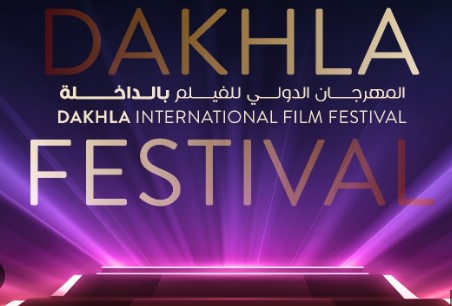The 12th edition of the Dakhla International Film Festival opened on Tuesday evening, in the presence of a plethora of artists, filmmakers, and personalities from the world of art, culture, and media.
The opening ceremony of this festival, initiated by the association for cultural and artistic animation in the southern provinces, under the slogan “Dakhla, Gateway to Africa,” and which will continue until June 9th, was marked by a tribute to Moroccan and African artists and filmmakers, in addition to the screening of the Moroccan feature film “Ana machi ana” by director Hicham Jabbari.
Thus, homage was paid to directors Joseph Kumbela from the Democratic Republic of Congo, Mohamed Abderrahman Tazi from Morocco, and Moroccan actress Majdouline Idrissi.
Another tribute was also paid to the director of the Moroccan Cinematographic Center (CCM), Abdelaziz El Bouzdaini, in recognition of his distinguished contribution to enriching the Moroccan cinematic scene.
Speaking on this occasion, the president of the festival, Zine El Abidine Charafeddine, indicated that after 11 editions, this festival is now an important Afro-Arab cinematic rendezvous, which has carved out a prominent place in the African cultural scene and the Middle East.
Mr. Charafeddine also expressed his determination to further develop this cinematic festival and promote the Dakhla destination, through culture in general and cinema in particular, stating that he was impressed by the enthusiasm generated by this annual event.
The novelty of this edition, he continued, is the establishment of the “Dakhla Project” platform, aimed at supporting ongoing feature film screenplay projects, adding that this cinematic gathering aims to promote cultural and artistic animation in the Dakhla-Oued Eddahab region.
The 12th edition of the Dakhla International Film Festival will feature the screening of a series of feature films, including “Goodbye Julia” by Mohammed Kordofani (Sudan), “The Ghost of Boko Haram” by Cyrille Raingou (Cameroon), “Me, Captain” by Matteo Garrone (Italy), “When Africa” by David-Pierre Fila (Congo Brazzaville), “Mami Wata” by J.S. Obasi (Nigeria), “Amakor” by Ahmed Alkhudari (Kuwait), “Three” by Nayla Al Khaja (United Arab Emirates), and “Glass of Friendship” by Naoufel Berraoui (Morocco).
Chaired by Belgian director Manuel Poutte, the jury of the official competition of this cinematic rendezvous is composed of university professor Sanaa Ghouati from Morocco, writer and director Rahmatou Keita from Niger, actress Salwa Mohammad Ali from Egypt, and director Michael Rayburn from Zimbabwe.
As for the short film competition, it includes “Legacy” by Hussein Hijazi (Lebanon), “Lobi Ekosimba” by Kumbuka Maini (Democratic Republic of Congo), “Sous Silence” by Mazigna Barros (Senegal), “Sent by God” by Amina Mamani (Niger), “Al-Banjeri” by Moosa Nasser Al-Kindi (Oman), “Disappearance of Mrs. V” by Mena Yuosry – (Egypt), “Miss Selfie” by Naima Ziani (Morocco), and “Hair Salon” by Fatima Wardy (Sudan).
The jury for short films, chaired by Moroccan director Adil Fadili, is composed of Cameroonian director Mary-Noel Niba, Tunisian director of photography Amine Messadi, Moroccan journalist Laila Ellab, and French director and editor Catherine Mantion.
As part of the parallel activities of this event are a symposium on “Cinema and Artificial Intelligence: A Trojan Gift?” and a roundtable on “Cinema and the National Narrative,” in addition to two meetings on “Cinema and Distribution: Audiovisual Distribution Strategies” and “Cinematic Expertise of Director Mohamed Abderrahman Tazi,” as well as a workshop focused on the principles of filmmaking.
Likewise, public film screenings are planned, including the Moroccan film “The Divorcees of Casablanca” by Mohamed Ahed Bensouda, as well as animated films for children.
Furthermore, this edition will be marked by the establishment of the “Dakhla Project” platform aimed at supporting ongoing feature film screenplay projects by Arab, African, or diaspora producers and directors.




